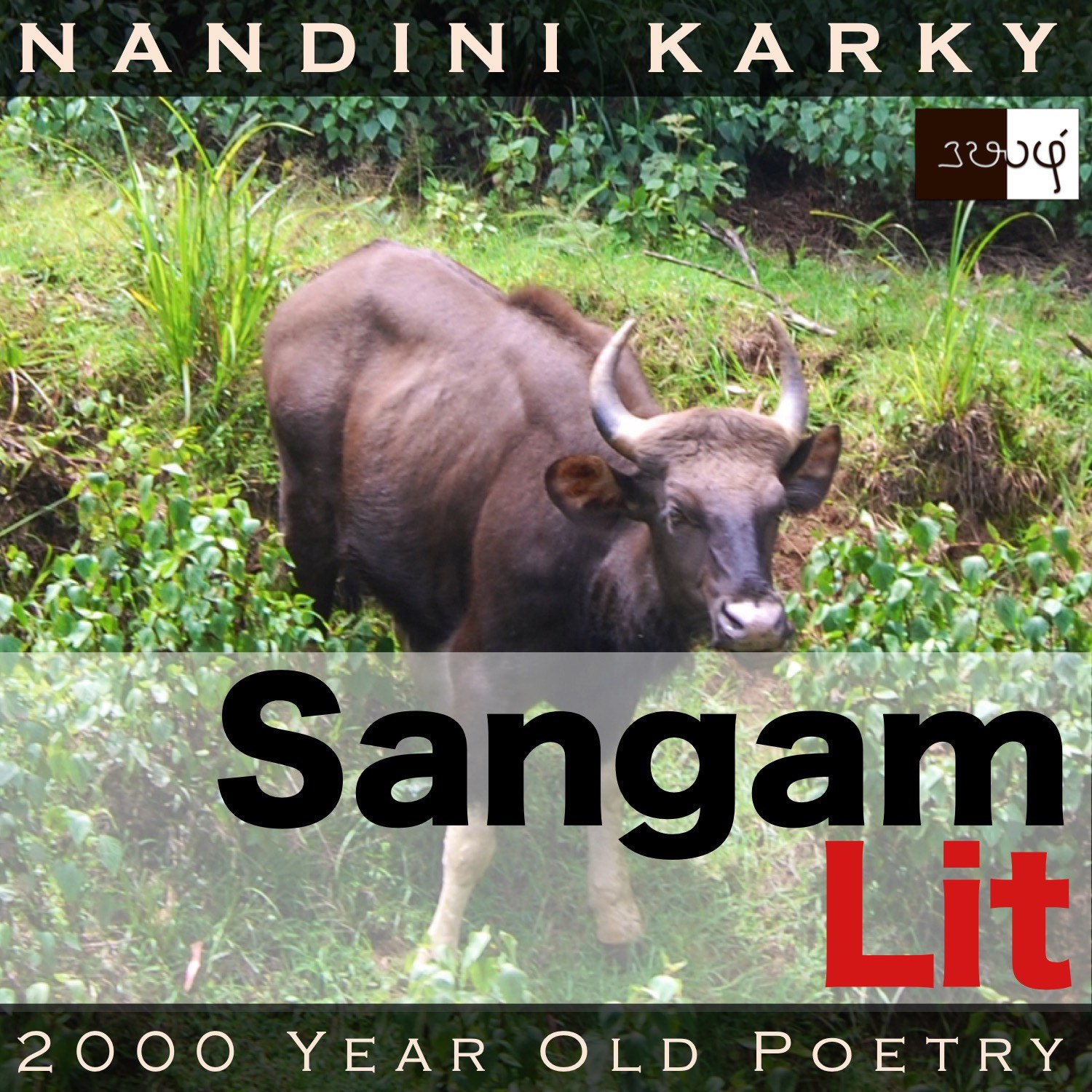Podcast: Play in new window | Download
Subscribe: Apple Podcasts | Spotify | Amazon Music | Android | iHeartRadio | Email | TuneIn | RSS | More

In this episode, we perceive hunting beliefs and marriage customs, as portrayed in Sangam literary work, Natrinai 165, penned by an anonymous poet. The verse is set in the mountain country of ‘Kurinji’ and speaks in the voice of the confidante to the lady, advising her as marriage proposals from strangers pour in.
அமர்க் கண் ஆமான் அரு நிறம் முள்காது
பணைத்த பகழிப் போக்கு நினைந்து, கானவன்,
”அணங்கொடு நின்றது மலை, வான் கொள்க” எனக்
கடவுள் ஓங்கு வரை பேண்மார், வேட்டு எழுந்து,
கிளையொடு மகிழும் குன்ற நாடன்
அடைதரும்தோறும், அருமை தனக்கு உரைப்ப,
”நப் புணர்வு இல்லா நயன் இலோர் நட்பு
அன்ன ஆகுக” என்னான்;
ஒல்கான் தோழி; மிகப் பல்கின தூதே.
As yet another testimony to the fascination of Sangam poets with eyes, the poem opens with ‘அமர்க் கண் ஆமான்’ meaning ‘wild cow with desirable eyes’. Looking at ‘நிறம்’, we may think of ‘colour’, the meaning in contemporary times. However here, the word points to ‘chest’. Then, ’பணைத்த பகழி’ talks about the ‘arrow that missed’. The phrase ‘அணங்கொடு நின்றது மலை’ evoked images of a news I recently read. But, before I relate that, the meaning of this phrase is ‘god has descended on these mountains’. The word ‘anangu’ refers to ‘god’ here and the appearance of this word in connection with ‘mountain’ made me think of ‘Uluru’, the large sandstone rock formation in Australia. This rock formation is considered sacred by the Australian aborigine tribe, who are coincidently called ‘Anangu’, and last week’s news revealed that their long struggle has led to the ban on climbing this rock from 26th October 2019. Being aware of many research articles about links between Australian aborigines and Tamils from ancient India, I cannot help wondering if the word ‘anangu’ somehow links these two cultures! Returning from that rock mountain in Australia, we glimpse at ‘குன்ற நாடன்’ meaning ‘lord of the mountains’. The poem then ends cryptically with word ‘தூதே’ meaning ‘messages’. Let’s explore the meaning behind these messages.
The man and lady have been in a love relationship for a while. The confidante sensing that the man has not been keen on formalising the relationship comes to the lady and says, “Thinking about how their arrows failed to pierce the thick chest of the wild cow with beautiful eyes, the hunter says, ‘It looks like god has descended on this mountain. Let the mountain be appeased with rain’. They join with their kith and kin and with devotion, take up rituals to please the god of the high mountains. The mountain lord comes from such a land. Whenever he comes to meet with you, as I describe the hardships and say to him, ‘Those relationships that have love but no kindness will be ruined’ he heeds not and persists in trysts with you, O friend. So many proposals from strangers have come forth for you too!” With these words, the confidante reveals how the lady’s parents have been receiving marriage proposals for the lady’s hand and conveys that the time had come for the lady to reveal her relationship with the man to her kith and kin.
Time for a detour to view a mountain hunt so as to understand the social customs in marriage then. The confidante first talks about how hunters stand around investigating the reason why the arrows from their quivers failed to pierce through the hide of that wild cow, which stands unaffected. Then, they conclude that their hunt has not been successful only because the spirit of the mountains has decided that it will not be. They understand that the only way this mountain god will show that it is appeased is when the rains pour. So, they join together with their kith and kin, and take up celebratory rituals to calm that mountain spirit. They hope to see the sign of appeasement in the pouring of rains and thereby, they will be assured that their future hunts will be successful. After describing this scene, the confidante as always finishes by mentioning it to be a description of the land of the lord. But we know there’s a metaphor and a message hiding within.
The confidante then talks about how she has insisted many times to the man about the dangers in not formalising the relationship and yet he continues to tryst with the lady by day and night. And then, she puts the twist in the story by saying the lady has been receiving many marriage proposals from strangers and her parents were considering the same. With this, the confidante informs the lady about her precarious situation and advises that the only course of action is the revealing of the lady’s relationship with the man. It is to press on this message that the confidante has brought in that scene of the hunt. Like the arrows of the hunters have failed to pierce the chest of the wild cow, the confidante’s words too have failed to enter the man’s heart. The way to resolve this predicament of marriage with some stranger is for the lady to reveal the relationship to her kith and kin. The confidante believes that like how the kith and kin of the huntsmen gather to appease the mountain spirit, so will the lady’s kith and kin agree to her happy union with the man. As I made sense of the verse, I couldn’t help but smile at how the confidante has likened the attitude of the man to the skin of a wild cow. To place in modern lingo, she has called him ‘buffalo-skinned’ for failing to heed her words. But, this act of revealing the lady’s relationship to her kith and kin will bring home that wild buffalo, the confidante believes, as the man will have no other go but to rise to uphold his name!




Share your thoughts...